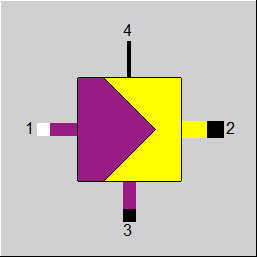

|
Line connections |
|
|
|
1 |
Inlet |
|
|
2 |
Outlet |
|
|
3 |
Residue Outlet |
|
|
4 |
Heat difference |
|
This component converts a stream of the universal fluid type into a simple fluid type. If the universal fluid (line 1) contains substances that cannot be contained in the provided main outlet line (line 2), these will be discharged via the residue outlet line (line3, which is of the type ‘universal fluid’). The outlet stream, line 2, can be of the stream types: air, flue gas, steam, water (liquid), crude gas, oil, coal, gas, 2-phase liquid, 2-phase gaseous, salt water, user defined, universal fluid, binary mixture, thermo liquid and humid air.
Due to the different material tables, a difference in enthalpy can occur. The respective heat quantity will be displayed on the logic line “Heat Difference”, so the user can decide on its further utilization.
Note:
Due to the expansion of the substances in the “classic“ fluids (Release 11), the fluid converter (Component 100) is now able to execute conversions for which this was not
possible in Release 10. This may lead to different results in existing models.
NCV for Fluid converter (Component 100)
Depending on the type of conversion, it may happen that libraries are involved that do not support a calculation of the NCV. To allow an NCV to be defined at the outlet anyway, the flag FSPECNCV permits the following variants:
The conversion to NASA fluid takes into account the phases of H20 (NH3 and CO2 are also are also taken into account, but NASA does not have fluid data for liquid phases).
When opening older models (before Release 14), FSPECNVC = 2 is set.
|
FSPECNCV |
Method for outlet heating value specification Like in Parent Profile (Sub profile option only) Expression =0: Calculate from composition |
|
NCV2 |
Lower heating value main outlet |
|
NCV3 |
Lower heating value residue outlet |
 |
Display Option 1 |
Click here >> Component 100 Demo << to load an example.